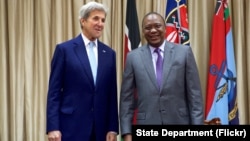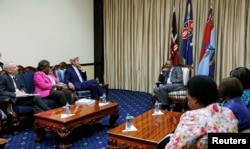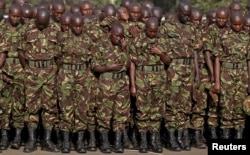South Sudan was at the top of the agenda as U.S. Secretary of State John Kerry met Monday with Kenyan President Uhuru Kenyatta and foreign ministers from Kenya, Uganda, Sudan, Somalia, and South Sudan in Nairobi, at the start of a three-country tour.
The secretary of state announced the United States would be giving $138 million in new aid to South Sudan, which he said would be used for food, water, and medicine for those in need.
He also issued a warning to that country’s leadership.
“But I want to make this clear,” said Kerry. “And I particularly think it is important for the people back home who are engaged in trying to help, I am talking about our taxpayers in the United States. We made it crystal clear, that this is not forever, we are not just going to fill in a void. We are not just going to provide help incessantly if they are not willing to accept responsibility and do the things necessary to deliver to their people. That message was delivered loud and clear today.”
Kerry also said it is urgent to deploy the 4,000-troop regional protection force in South Sudan recently authorized by the U.N. Security Council. President Kenyatta thanked the U.S. government for sponsoring that resolution.
It is in the interest of many countries in East Africa to deploy this protection force, says Abdullahi Boru Halakhe, a security analyst. He says the only way of stabilizing Juba right now is by doing so.
“Countries like Kenya and Uganda are hosting refugees from South Sudan,” said Halakhe. “They have given aid, the only thing that is left probably is to send peacekeeping troops. The government of Salva Kiir has not been amenable to that, but there is no any other option. Riek Machar cannot go back because a significant number of his military has been decimated so he won’t trust Salva Kiir to give him the military.”
Deadly clashes
The U.S. proposed the force after clashes in South Sudan's capital last month killed about 300 people and prompted opposition leader Riek Machar to flee the country.
"Let me emphasize, this is not an intervention force, this is a protection force, with a very clear mandate to be able to protect people for their access, their freedom of movement, and their ability to remain free from attack or ambush from any source whatsoever,” said Kerry. “It is supplementary to the sovereignty and the efforts of South Sudan itself. And I think we had a good clearing of the air today, in the discussion that we had with the participants on the subject.”
Kerry also announced the United States would give an additional $117 million to support refugees, returnees and drought victims in Somalia. He said another $29 million will be donated to the U.N. refugee agency for the safe and voluntary return of Somali refugees in Kenya, primarily from the sprawling Dadaab camp.
Following an earlier closed-door meeting, a Kenyatta statement “expressed hope” Somalia will abide by its presidential election calendar, with polls scheduled for October 30. He also noted the importance of building capacity within the Somali National Army, as the African Union plans to draw down its mission in Somalia by 2018.
Security and Horn of Africa analyst Abdiwahab Abdisamad Abdisamad says a reformation of the Somali national army is the only way to restore security and stability in the country.
Somali military reformation proposed
“So many people are asking for themselves the last half a century how 22,000 AMISOM troops, 10,000 Somali troops, the alpha group unit trained by the U.S. government, plus other Somali regional administrations’ troops are over 100,000 troops," said Abdisamad. "All those forces are struggling to contain 5,000 militants. Therefore, this proves that this project is a failure and it is clear that a reformation of Somali military is better.”
Richard Tuta, a Kenyan homeland security expert, argues that Somalia impacts Kenya’s national security more than that of South Sudan, and that priority should be given to stabilizing Somalia.
“The happenings in South Sudan do not affect Kenya as a country directly, they only affect Kenya on refugee issues. But the happenings in Somalia, the insecurity in Somalia affect Kenya as a country directly," said Tuta. "Somalia has been the command center of al-Shabab. Kenya is always on the receiving end of anything that happens in Somalia. Kenyan engagement in Somalia is of its own interest, but engagement in South Sudan is the opposite.”
Kerry noted that he and Kenyatta discussed the importance of preparations for Kenya’s 2017 national elections, and he said the United States is investing more than $25 million to support that electoral process.
“I am pleased to see that progress is being made in reforming the Independent Electoral and Boundaries Commission and I urge in the most emphatic terms that disagreements about policy and process be resolved through peaceful means,” said Kerry. “Kenya has come a long way since the elections of 2007. It is up to leaders on all sides that the violence that took place in the aftermath of that election is never repeated.”
Later in the day, Kerry met with participants in the Young African Leaders Initiative and the Mandela Washington Fellows programs.
Kerry will next travel to Nigeria and then Saudi Arabia.
Mohammed Yusuf and Harun Maruf contributed to this story.






